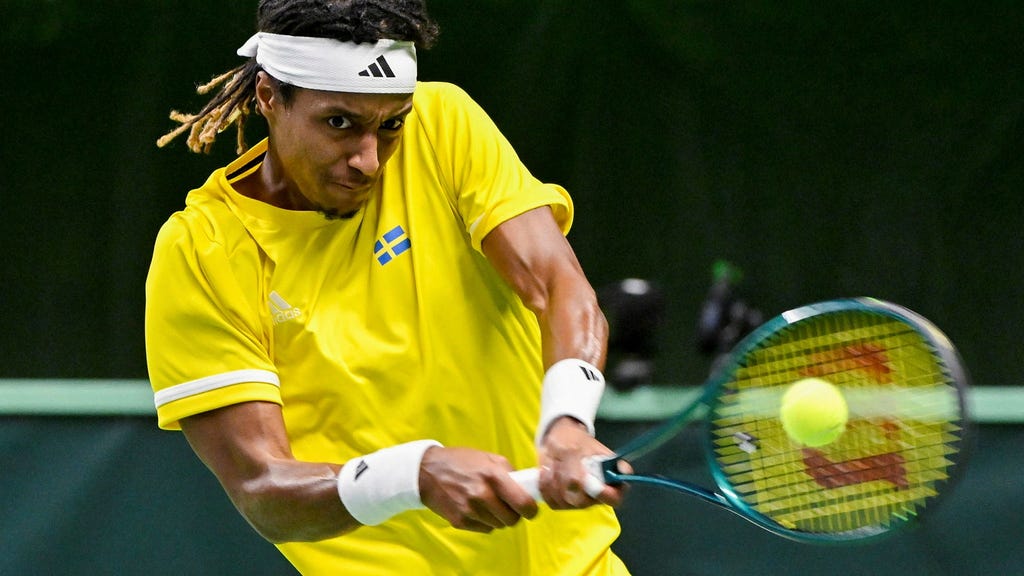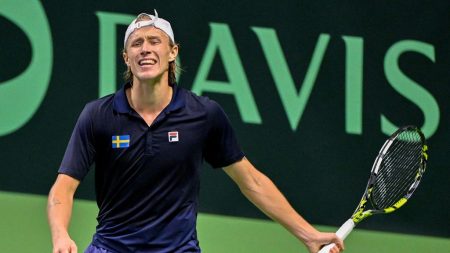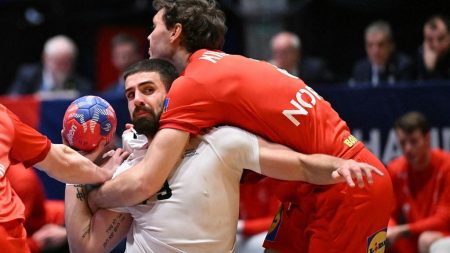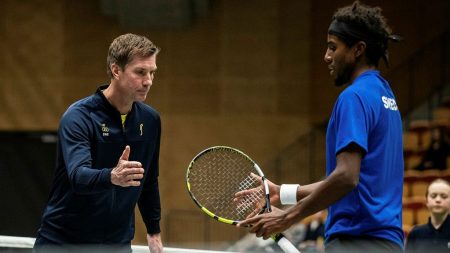The Swedish Davis Cup team faced a formidable challenge in their opening tie against Australia, a nation boasting a rich tennis history and currently ranked among the top contenders in the competition. The tie, held on Australian soil, presented a daunting task for the Swedes, particularly with the absence of their top-ranked player. Despite the uphill battle, the young Swedish squad displayed grit and determination, pushing their Australian counterparts to the limit in both opening singles matches. Though the ultimate outcome favored the home side, the close contests offered glimpses of promise for the future of Swedish tennis and highlighted the unwavering competitive spirit of the team.
Mikael Ymer, the spearhead of the Swedish contingent, engaged in a thrilling duel with Alex de Minaur, the world number eight. Ymer, known for his tenacity and dynamic playing style, refused to be intimidated by his higher-ranked opponent. He matched de Minaur’s intensity stroke for stroke, constructing points with intelligent shot selection and showcasing his impressive court coverage. The match unfolded as a captivating display of athleticism and tactical prowess, with both players trading blows and momentum swings. While de Minaur’s experience and consistency ultimately tipped the scales in his favor, Ymer’s performance resonated with resilience and signaled his growing presence on the international stage. He pushed de Minaur to the brink, extracting errors and forcing the Australian to dig deep to secure the victory. The close nature of the match served as a testament to Ymer’s burgeoning talent and his ability to compete with the world’s elite.
Following Ymer’s valiant effort, the spotlight shifted to Leo Borg, son of the legendary Björn Borg, who faced Aleksandar Vukic in the second singles match. Carrying the weight of a famous surname, Borg exhibited composure and focus beyond his years. Undeterred by the pressure and the partisan Australian crowd, he engaged in a tight contest with Vukic, demonstrating his developing skills and tactical acumen. Borg’s game, characterized by consistent groundstrokes and a calm demeanor, mirrored elements of his father’s iconic style. He battled fiercely, showcasing his improving serve and his ability to absorb the pace of Vukic’s powerful shots. While Vukic ultimately prevailed, Borg’s performance offered a glimpse into his potential and suggested a bright future for the young Swede. He demonstrated a fighting spirit and a level of maturity that belied his relatively young age in the professional ranks.
Despite the impressive individual performances by Ymer and Borg, the scoreboard reflected a 2-0 lead for Australia after the opening day. The reality of Davis Cup competition is that individual brilliance must translate into team victories. While the Swedish players demonstrated their competitive spirit and the ability to challenge top-ranked opponents, they ultimately fell short of securing the crucial opening points. The doubles match loomed as a must-win for the Swedish team to keep their hopes alive in the tie. The pressure mounted on the Swedish doubles pairing to deliver a victory and shift the momentum back in their favor.
The Australians, buoyed by their strong start, entered the second day with confidence and the advantage of needing only one more victory to secure their progression in the Davis Cup. De Minaur and Vukic’s victories had laid a solid foundation, allowing the Australian doubles team to play with a degree of freedom. Conversely, the Swedes faced a do-or-die scenario, requiring a flawless performance in the doubles and a subsequent sweep of the reverse singles to complete a remarkable comeback. The contrasting circumstances created a compelling narrative for the remainder of the tie, with the Australians aiming to capitalize on their momentum and the Swedes seeking a resurgence fueled by resilience and determination.
The 2-0 deficit presented a significant hurdle for the Swedish team, but it did not diminish the significance of their performances. Ymer and Borg’s displays of grit and determination against formidable opponents offered a positive outlook for the future of Swedish tennis. While the immediate goal of advancing in the Davis Cup remained a challenging prospect, the experience gained and the close contests would undoubtedly contribute to the development of these young players. The tie served as a valuable learning experience, highlighting areas for improvement while simultaneously reinforcing their potential to compete at the highest level of the game. The future of Swedish tennis rests on the shoulders of players like Ymer and Borg, and their Davis Cup performances provided a glimpse of the exciting potential that lies ahead.














